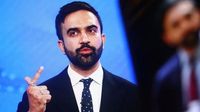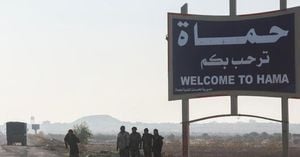In a city known for its political earthquakes, few have been as jarring—or as hotly debated—as Zohran Kwame Mamdani’s surprise victory in New York City’s Democratic mayoral primary. On June 24, 2025, Mamdani, a Queens-based State Assembly member and self-described democratic socialist, unseated former Governor Andrew Cuomo and nine other contenders, sending shockwaves through both the city’s political establishment and its grassroots activist circles. But as the dust settles, the conversation around Mamdani’s candidacy has become about more than just his policy proposals—it’s a referendum on the soul of the city itself.
Mamdani’s ascent is rooted in an eclectic personal history that mirrors New York’s own diversity. Born in Kampala, Uganda, in 1991 to renowned filmmaker Mira Nair and postcolonial scholar Mahmood Mamdani, Zohran’s early years spanned continents, from South Africa’s Cape Town to the neighborhoods of Manhattan. His parents, both of Indian descent, instilled in him a sense of global citizenship and a passion for justice. By the time his family settled in New York when he was seven, Mamdani was already thinking about how to make the world fairer—a theme that would define his career.
After graduating from the Bronx High School of Science and earning a degree in Africana studies from Bowdoin College, Mamdani dove into community work. He became a foreclosure prevention and housing counselor in Queens, helping nonwhite homeowners stave off eviction. This, he said, was “a key motivator” for entering politics, as reported by The New York Times. Alongside his advocacy, Mamdani nurtured a creative side, performing as a hip-hop musician under the names Young Cardamom and Mr. Cardamom, and curating the soundtrack for his mother’s film Queen of Katwe.
Mamdani’s political rise was rapid. Inspired by Bernie Sanders’ 2016 campaign, he joined the Democratic Socialists of America (DSA) and managed campaigns for other progressives before winning a seat in the State Assembly in 2020. There, he sponsored 20 bills—three of which became law—and co-sponsored 238 more by May 2025. His legislative focus: affordable housing, public transit, and social justice. Notably, he launched a fare-free bus pilot program and joined a hunger strike with taxi drivers, demonstrating a willingness to get his hands dirty for working-class New Yorkers.
His mayoral campaign, announced in October 2024, doubles down on these themes. Mamdani’s platform includes a rent freeze on stabilized units, construction of 200,000 affordable homes, a $30 minimum wage by 2030, and a 2% income tax hike for millionaires—measures he claims would generate $20 billion for tuition-free public colleges, universal childcare, and free city buses. “I don’t think we should have billionaires,” he declared in June 2025, distilling his philosophy of wealth redistribution.
But Mamdani’s vision extends beyond economics. He champions community-based public safety, proposing a Department of Community Safety to prioritize mental health outreach and social work over policing. While he once tweeted support for defunding the NYPD, he clarified during the campaign that he would work with police “rather than defund them,” emphasizing a nuanced approach to public safety. On climate, he’s pushing for 500 public schools to be retrofitted with solar panels and green infrastructure, and he supports congestion pricing to cut emissions.
Healthcare is another cornerstone. Mamdani backs the New York Health Act, which would establish single-payer healthcare statewide, and he’s advocated for increased funding for gender-affirming care, especially in response to federal threats to trans health services. His education proposals include universal pre-K and redirecting property tax breaks from elite universities to the city’s underfunded public colleges.
On foreign policy, Mamdani is outspoken—sometimes controversially so. He’s a fierce critic of Israel, supporting the Boycott, Divestment, and Sanctions movement and introducing a state bill to bar charities from funding West Bank settlements. After the Hamas-led attacks on Israel in October 2023, he condemned the violence as a “horrific war crime” and was arrested at a pro-Palestinian demonstration. He’s also criticized U.S. airstrikes on Iran and budget cuts to refugee programs, and has refused to meet with Indian Prime Minister Narendra Modi, whom he calls a “war criminal.” These positions have earned him both admiration and fierce condemnation, with some Indian leaders accusing him of spreading “blatant lies.”
Mamdani’s victory has energized the city’s left, but it’s also galvanized his critics—especially after the Democratic Socialists of America’s annual “Socialism 2025” conference in Chicago last month. There, panelists called for the “abolition” of the traditional family, likened marriage to prostitution, and argued that abortions should be performed in churches. Olivia Katbi, co-chair of the DSA in Portland, Oregon, told attendees, “In addition to the abolition of family policing, we argue for abolition of the family in general and say that the institution of the family acts as part of the carceral system in that it reinforces children as property.” Eman Abdelhadi, a University of Chicago assistant professor, added, “When we talk about family abolition…we’re talking about the abolition of the economic unit. It is a horizon…in which all of our material needs are taken care of by the collective.”
Emily Janakiram, a Brooklyn-based organizer, went further: “The only real difference between marriage and prostitution is the price and the duration of the contract. Sex work and marriage can’t exist without each other—they’re two sides of the same coin.” The panel even included a Baptist minister from Austin, Texas, who said, “I want to perform abortions at a church before it’s all said and done.” Panelists nodded in agreement, reflecting a radical vision that’s left many New Yorkers uneasy.
Critics, including Stu Smith of the Manhattan Institute, argue that the DSA’s anti-family rhetoric is out of touch with most voters—and that Mamdani’s own lavish wedding in Uganda is hypocritical. “He’s a nepo baby from a traditional family—but then he wants to distribute the wealth while also just having a luxury wedding,” Smith told The New York Post. Queens Councilman Robert Holden, a moderate Democrat, warned, “Zohran Mamdani and his allies in the DSA are openly laying out their radical ‘Project DSA 2026’ agenda for state-run families, indoctrinating our children, and dismantling the very fabric of our society. This is exactly why we must defeat Mamdani and ensure he never gets anywhere near Gracie Mansion or City Hall.”
Mamdani’s campaign did not respond to requests for comment on the DSA conference. But his supporters point to his record of advocacy and coalition-building, noting endorsements from U.S. Representatives Adriano Espaillat and Jerry Nadler, as well as powerful unions like the United Federation of Teachers and the New York State Nurses Association. They argue that his focus on affordability, equity, and justice is precisely what the city needs in a time of crisis.
Meanwhile, Mamdani has faced a barrage of personal attacks, including Islamophobic and xenophobic rhetoric from national Republicans. Donald Trump dubbed him a “100% Communist lunatic” and threatened to investigate his citizenship, while others tried to tie him—without evidence—to extremism. Even some centrist Democrats have expressed reservations, with The New York Times editorial board calling his experience “too thin” and his agenda “a turbocharged version of Mr. de Blasio’s dismaying mayoralty.”
Despite the noise, Mamdani’s campaign has forced a reckoning over what kind of city New Yorkers want—and who gets to shape its future. Whether his vision will prevail at the ballot box remains to be seen, but one thing is clear: the debate over New York’s direction has never been more intense, or more consequential.




